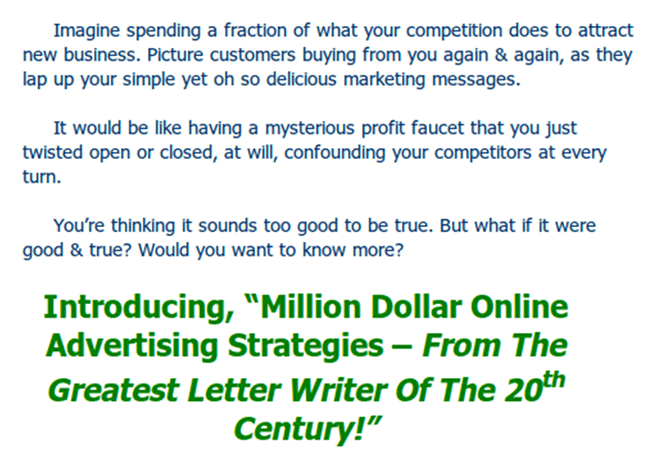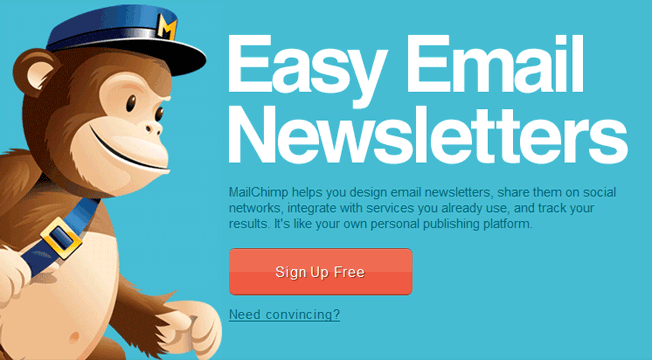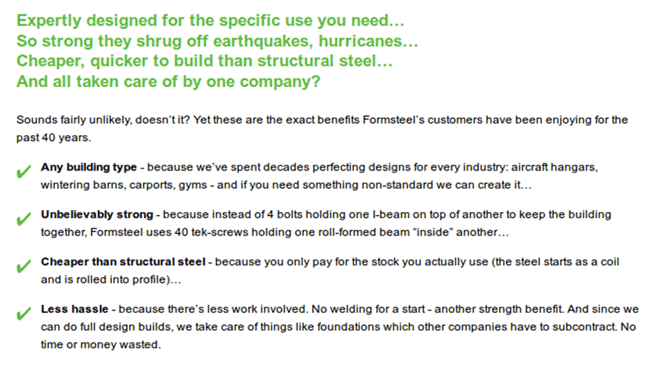Imagine if you had the power to influence people’s subconscious minds.
Imagine if you could do it by using simple trigger words to activate involuntary hypnotic “reflexes” in their brains.
Now imagine you could do it in writing as well as in speech.
You probably don’t believe this can actually happen. But I’m going to tell you that it can—because over time we’ve all been subtly hypnotized to accept certain trigger words. The process started before we could even talk.
You would never suspect these hypnotic words of holding any power. They are simple, and innocuous. But when you use them consciously and correctly, they can dramatically improve your persuasive power.
I have already used six of them to keep you reading.
Now, I doubt you will ever guess all of them—let alone deconstruct why they work. So I’m going to go through the top three and tell you why they’re so potent. And I’ll include examples to help you put them to use.
But before I do that, a word about what hypnosis is, is not—and why these words are considered hypnotic.
What Hypnosis Actually Is
Few marketers have more than a common “knowledge” about hypnosis. That’s a pity because hypnosis is a very powerful psychological tool—and marketing is all about psychology.
Here are some things you may think you know about hypnosis that are actually pure myths:
- Hypnosis is mumbo-jumbo. Actually, it is a century-old psychological tool used by many doctors, dentists, psychiatrists and therapists to achieve everything from anesthesia without anesthetics, to stomach stapling without staples.
- When you’re hypnotized you’re asleep. Actually, you are simply relaxed. Your subconscious mind is more active than your conscious (critical) mind.
- I can’t be hypnotized. Actually, we all go into varying states of hypnosis many times each day. When driving, when watching TV, when reading—you may even be in a state of mild hypnosis right now.
- Hypnotized people are like zombies or robots. Actually, you can’t make someone under hypnosis do anything they don’t already want to do. Sure, their subconscious mind is “exposed” in a state of hypnosis, so they’re more willing to have their emotions—and ultimately their decisions—directed. And that’s good for us as marketers and salespeople—assuming that we’re in this for the right reasons: i.e., helping people. But if they really don’t want something, you ain’t gonna sell it to them no matter what. So before you read on it would be smart to just double-check the first rule of sales, and make sure that your audience actually wants what you’re offering them.
Okay, I’m glad we cleared that up. Let’s get into these three “power words” shall we?
1. “IMAGINE”
Why it’s hypnotic
Two factors are at work here.
Firstly, you may have noticed that if you ask a stranger to do something—especially to buy something—they tend to balk. Their natural reaction is to question the instruction. To find a reason to disagree with it. The critical mind throws up objections.
What’s interesting, though, is this doesn’t happen if you just ask someone to imagine something. Especially if you ask them to imagine the outcome of the sale, rather than making the purchase itself. There’s no resistance to that.
This is because we don’t see imagining as a “real” task. It’s just a mind-game. Indeed, an enjoyable game; a distraction from life—as with fantasies.
So by asking your prospect to imagine something, you bypass that critical part that throws up objections, and “sneak in” to their mind through the back door of their imagination. And bypassing the critical mind is the second of three crucial steps to achieving hypnosis. (The first is attracting the person’s attention, which I’ll assume you’ve already done.)
The third step is to stimulate the unconscious mind. That is exactly what imagining something does. As strange as it may sound, the brain literally cannot tell the difference between imagining reality, and actually experiencing reality. As far as your brain is concerned, there’s no difference between visualizing a tree, and seeing a tree.
This makes your prospect’s imagination a deceptively powerful ally to you. Remember—the fear of loss is far stronger than the desire for gain. So if you can get your prospect to feel a sense of ownership for your offering, you invoke a much stronger desire than by merely offering benefits. By getting them to imagine owning it, they become as if they already have it. As if you have already given it to them. And the natural thing to do then is to keep it…which means making the purchase.
This sense of ownership over what we imagine is surprisingly deep-seated. It should be. Our youngest years are ruled by our imaginations. Kids are highly possessive of their make-believe ideas and characters and worlds. They don’t like to be told they aren’t real. And although as adults we’ve managed to conceal that affection for our fantasies under a veneer of pragmatism, the same effect still governs our behavior at a subconscious level.
An example
Daniel Levis has made a study of the psychology of persuasion. Here, he not only asks his prospect to imagine the outcome of buying, but also to picture it. Different words—same idea. Repeating the concept in different ways makes it even harder to resist.
2. “YOU”
Why it’s hypnotic
You is a placeholder for your name.
I know—it’s an obvious one. The three most powerful words in sales, perhaps, are you, free and guaranteed.
But free and guaranteed aren’t hypnotic words. You is. And that’s because it is not actually the word you that has hypnotic power—but the name it represents.
Your name.
I’m willing to bet you have no idea just how hypnotic your name actually is.
For example, did you know that you are much more likely to buy from someone who has the same sounding letter in their first or last name as you do? This according to The Journal of Consumer Research. You’re also more likely to marry someone with the same initial.
And think to your own experience. Don’t you automatically want to like people who have the same name as you? Don’t you feel like they deserve more of a chance than other people? Actors, for example. I don’t just like David Tennant because he’s talented. Irrational as it is, I can’t help feeling that I ought to like him.
Many email marketers have latched onto the fact that a person’s name is powerful—you probably receive emails with subject lines like, “Methuselah, top 10 copywriting tricks”. And many emails you get will start with your first name; long ones will include it several times.
You might also have noticed that this approach doesn’t work. It immediately marks the email out as “artificial”. It doesn’t feel right. And of course not—because no one but a marketer would email you like that. Or perhaps someone close to you, if you were in big trouble. “Methuselah you jackass, don’t bother coming home.”
You may have experienced the same thing from telemarketers. Their script always has them saying your name—as if it will build rapport. But it actually just feels creepy.
A person’s name is so powerful that you have to have a very light touch when you use it.
But the word you is different. It’s natural to use it in conversation, so you don’t need to worry about being heavy-handed. Yet it encapsulates the same basic self-obsessiveness that makes your own name so powerful. (Don’t get me wrong; I’m not criticizing you. We’re all self-obsessed. It’s just the nature of being human.)
The reason words that refer to us are so hypnotic has to do with a psychological effect called Fundamental Attribution Error. Basically, while we are naturally critical of other people, our critical minds take a break when we evaluate ourselves. That analytic part of us just doesn’t kick in. You may not have noticed this about yourself—but I bet you’ve noticed it about all those oblivious inconsiderate jerks constantly making your life miserable.
So when people talk about us, we tend to be lulled. What they’re saying bypasses the critical factor—and all that’s left then is to stimulate the unconscious mind.
And guess what? There’s nothing as stimulating to us as our own interests, desires, ambitions, goals, yearnings and emotions. For our whole lives, that is all we really have. So as long as your copy addresses those things for your prospect, it is guaranteed to carry them along in a rapt, semi-torpid daze of introspection.
An example
Look at how MailChimp uses the word you on its homepage. The third word of the body copy is you. And it is used twice more in the same sentence (yes, your counts). Then again as the third word of the second sentence. And to top it off, they also use the word “personal” to emphasize how much this service is for you.
Obviously this particular bit of copy is short—space precludes me showing you a very long example. But the effect is only amplified in longer copy.
3. “BECAUSE”
Why it’s hypnotic
Once again, it’s all about bypassing the critical factor so we can stimulate the unconscious mind.
You’ve probably heard of “reason why” advertising—a phrase I believe comes from John E Kennedy, though I learned it from Drayton Bird. As human beings, we crave order. We want to know why something is the way it is, what caused something to happen. And we crave it particularly in our own lives.
These kinds of reasons, these relationships of cause and effect, are encapsulated in the word because. When our mind’s gatekeeper—the “critical factor”—hears that word, it treats it as a cue to let the speaker (or writer) through to the unconscious mind.
This is expertly illustrated by Robert Cialdini in Influence: The Psychology of Persuasion, where he cites a study you’ve probably heard of, performed by Ellen Langer at Harvard. Langer asked to push in line at the library to photocopy some papers:
“Excuse me, I have five pages. May I use the Xerox machine because I’m in a rush?”
The number of people who agreed: 94%.
Excuse me, I have five pages. May I use the Xerox machine?
The number of people who agreed: 60%.
You’d be inclined to think the difference was because of the reason she gave. But a further experiment indicated otherwise…
Excuse me, I have five pages. May I use the Xerox machine because I have to make some copies?
The number of people who agreed: 93%. Notice that no real reason was given this time—obviously, everyone waiting for the Xerox machine had to make copies. Yet nearly as many people agreed as when a real reason was given.
If you think back to your own childhood, or watch how kids negotiate with their parents, you’ll immediately see that this does indeed work exactly as Langer showed. Perhaps this sort of situation sounds familiar:
“Mom, can I have some biscuits?”
“No darling, not now.”
“But mom, I love biscuits.”
“I know sweetie, but I said not now.”
“But mom, why?”
“Because I said so.”
Is that a real reason? No, it ain’t! It’s just a reiteration of what the kid already knows, right? But at this point, most children accept that it’s time to give up. And that’s something “programmed” into us, even as adults. It makes the word “because” very powerful.
However…
This is not a magic bullet. Langer conducted a further study where she upped the number of pages to be Xeroxed from 5 to 20. And in that situation, the times when a nonsensical reason was given for pushing in line got no more people to agree than the times when no reason was given. Conversely, when the reason of being in a hurry was given, it doubled the number of people who agreed.
In other words, using the word “because” satisfies the brain’s natural search for reasons. For small requests, you can actually short-circuit the process and trick the mind into moving to the next stage of the sequence as if a real reason had been given, because it’s simply not important enough to devote brainpower to analyzing the reason. But for larger requests—even just for 20 pages at the Xerox machine, let alone when asking for a purchase—the critical factor doesn’t turn off so easily.
Nonetheless, using because still triggers the reason-why reflex. Give a good reason, and “you’re in”, so to speak. Judging from Langer’s experiment, it could as much as double your response rate.
An example
Formsteel offers great benefits—then backs them up with solid reasons. Without the word because, the “reason why” reflex wouldn’t kick in automatically, and so the overall effect of the copy would be much weaker. Including because makes the mind accept the benefits are more unskeptically and unreservedly.
3 HYPNOTIC WORDS YOU CAN USE TODAY
These are not the only hypnotic words. There are others. But these three are particularly powerful, and particularly useful to us as marketers and salespeople.
Imagine. You. Because.
They are also conveniently easy to work into copy, into videos, and even into face-to-face sales presentations. Why not try it and report your results below?
About the Author: Bnonn is known in the boroughs as the Information Highwayman, he helps entrepreneurs sell more online by improving both their web copy and design. When he’s not knee-deep in the guts of someone’s homepage, he is teaching his kids about steampunk, Nathan Fillion, and how to grapple a zombie without getting bit.



Comments (79)